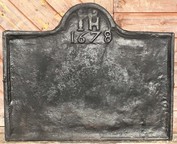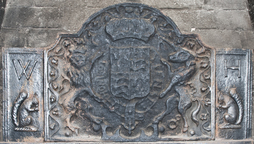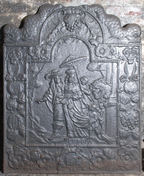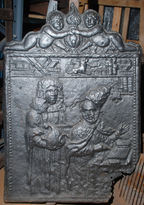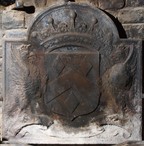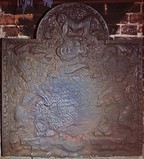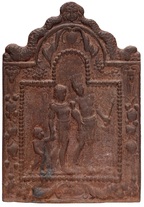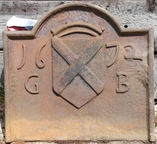-
603
Description: Arched rectangular shaped, the arch linked to the rectangle by cavetto curves; cavetto edging ending in two opposed spirals at top; initials below spirals; date below initials; otherwise plain.
Notes: Probably cast from a carved, edged board, with the initials and date added separately. A copy.
Copies of this fireback are known.
Inscription: IH / 1678
- Decoration tags:
- rectangular with round arch (shape)
- cavetto (edging)
- individual letters
- individual numbers
- text
Manufactured: in 1678 in the Weald area of England.
Current location: Banbury, Oxfordshire, England.
- Attached to series:
- Small arch series
-
201
Description: Rectangular; moulded fillet edging on top and sides; TCI, also arranged symmetrically, in a widely spaced triad; below, symmetrical layout of central rose and crown between two concentric roundels, with two fleurs-de-lys outside.
Notes: The style of rose and crown is similar to that used in gun founding in the Tudor period, suggesting that the furnace that was the source of this fireback may have been previously used for that purpose. Formerly at Baynards Park, Cranleigh, Surrey.
Inscription: 16 T C I [triad] 70
- Decoration tags:
- rectangular (shape)
- complex, furniture-derived (edging)
- carved stamps
- individual letters
- individual numbers
- heraldic
- royal
- text
Manufactured: in 1670 in the Weald area of England.
Current location: not known.
- Attached to series:
- 1660s-90s Wealden series
-
1244
Description: Cavetto-canted arched rectangular shape with rectangular extension panels; cavetto-moulded edging, with astragal on wide fillet edging on the extension panels; central panel, crown, shield and Garter of the Tudor royal arms but with crowned lion and unicorn supporters, all within an undulating vine border; extension panels comprise a single letter (W on left, H on right) above an inward-facing seated squirrel.
Notes: The royal arms are a hybrid of the Tudor and Stuart achievement, quite crudely modelled. The initials and squirrels both relate to the Holte family who lived at Aston Hall, which was built between 1618 and 1623. The difference in the condition of the armorial and the extensions suggest that the armorial was significantly older than the extensions. The bottom 190mm of the fireback is concealed below, behind the grate placed in front of it.
Inscription: W / HONY SOIT QUI MAL Y PENSE / H
Arms: English Tudor royal with Stuart lion and unicorn supporters
- Decoration tags:
- rectangular with canted top corners and round arch (shape)
- cavetto (edging)
- carved stamps
- carved pattern panels
- extension panels
- heraldic
- armorial
- royal
- text
- animals
Manufactured: in the mid- to late-17th century in England.
Current location: Aston Hall, Aston, West Midlands, England.
(part of the Birmingham Museums Trust museum group)
- Attached to series:
- Stuart royal armorial firebacks
-
219
Description: Arched rectangular central panel with bead on fillet edging, pictorial representation of a man and woman walking, behind the woman a child holds her train and a young person carries a parasol; from behind a column on the right, a horse's head is visible, a tree stands to the left, at the foot of the scene is the word 'EUROPA'; arched rectangular border with fillet edging, from a central bunch of grapes at the top of the arch, a ribbon on each side suspends bunches of fruit and flowers; at the bottom a central cartouche containing the inscription 'L7G', with flowers on each side;; on top are two mirrored dolphins.
Notes: The pictorial scene is based on an engraving c.1642 of Friedrich Wilhelm, Elector of Brandenburg, and his wife, Luise Henriette of Oranje-Nassau, by Mathias Czwiczek; one of series of firebacks depicting allegories of the four continents; the initials, L7C, denote the style of border - other firebacks having the same inscription have the same border - and other borders are denoted by similar inscriptions (e.g. L6C and L8G).
Copies of this fireback are known.
Inscription: EVROPA / L7C
Manufactured: in the mid- to late-17th century in the Siegerland area of Germany.
Current location: Preston Manor, Brighton, East Sussex, England.
Museum number: HA105000 (part of the Brighton Museum museum group)
- Attached to series:
- 'Dutch' LC/G series
- 'Dutch' Continents firebacks
-
216
Description: Rectangular with plait-effect border and a column of beads down each side; pictorial scene of a male figure in gown and full-bottom wig, holding a fool’s cap in his right hand, standing behind a seated male figure, bald and bearded, with the papal triple crown falling off his head; he is seated at a desk on which are two books; behind him and to the right, three books are on a small shelf. Above the figures, a longer shelf, the width of the plate, supports other books and papers, together with the figure of a dog, from whose mouth a scroll issues bearing an unreadable inscription. On top, two putti hold hands in front of a flaming grenade.
Notes: The design is copied from a cartoon of c.1672 showing Titus Oates, the instigator of the Popish Plot, presenting a fool’s cap to the Pope.
Copies of this fireback are known.
- Decoration tags:
- rectangular with ornate arch (shape)
- bead (edging)
- whole carved pattern
- pictorial
- humans
- objects
Manufactured: in the mid- to late-17th century in England.
Current location: Brighton Museum and Art Gallery, Brighton, East Sussex, England.
Museum number: HA105014 (part of the Brighton Museum museum group)
- Attached to series:
- Commemorative firebacks
-
1088
Description: Canted rectangular shape; cavetto-moulded edging (top and sides); across the top, double star stamp repeated nine times; below and top centre, date between initials in triad; below date, large hollow fleur-de-lys stamp repeated three times in a line between two triads of stylised fleur-de-lys stamps, with one of the same stamps in each bottom corner; lower centre, woodblock stamp repeated three times in a line.
Notes: The initials 'IIA' in triad probably relate to a couple whose surname initial was 'I' or 'J'; a fireback, dated 1659, with some of the same stamps is at the Dean Heritage Centre, Soudley, Gloucestershire, and another, dated 1667, has been noted at Upper End Farm, Hope Mansell, Herefordshire. Brightwells Auctioneers, Leominster, 27 Jul 2016, lot 694 (£480 inc. grate).
Inscription: IIA [triad] 1668 IIA [triad]
- Decoration tags:
- rectangular with canted top corners (shape)
- cavetto (edging)
- carved stamps
- individual letters
- individual numbers
- heraldic
- text
- objects
Manufactured: in 1668 in the Forest of Dean area of England.
Current location: not known.
- Attached to series:
- Hollow fleur Dean series
- Newent area group
- Fleur-de-lys firebacks
-
1029
Description: Arched rectangular shape; cavetto-moulded edging; shield, supporters, earl's coronet and motto scroll.
Notes: The arms are of the Hyde family: azure, a chevron between three lozenges or; the supporters: two eagles, wings endorsed sable, ducally crowned and charged on the breast with a cross or; Edward Hyde (1609-74) was created earl of Clarendon in 1661. An excrescence over the sinister supporter indicates where the iron was poured clumsily into the open sand mould.
Arms: Hyde, earls of Clarendon
- Decoration tags:
- rectangular with round arch (shape)
- cavetto (edging)
- whole carved pattern
- heraldic
- armorial
Manufactured: in the mid- to late-17th century in England.
Current location: The Lygon Arms, High Street, Broadway, Worcestershire, England.
- Attached to series:
- Personal armorial firebacks
-
1262
Description: Arched rectangular shape; ‘egg and dart’ ovolo moulding visible on top and sides; shield, helmet, crest, mantling and supporters of the Mohun family; above the crest, the initials 'EM'; date separated by the crest.
Notes: Cast from a finely carved pattern, the supporters denote these are the arms of a peer. The crest is: Gules, a maunch ermine, with a hand proper holding a fleur de lys or. An incomplete casting (without the initials or date) from Sidney Farm, Alfold, Surrey, is in Guildford Museum. Reginald Mohun (pron. Moon) of Dedisham, Slinfold, Sussex, married Elizabeth Blounte of Dedisham at Slinfold 21 Dec 1618. The Mohun barony of Okehampton, Devon was created in 1628. The fireback design probably dates from after that, the initials and date being added when this copy was cast in 1676. Bellmans auction, Wisborough Green, 1 Oct 2020 lot 3084 (£45).
Copies of this fireback are known.
Inscription: EM / 16 76 / [indecipherable motto]
Arms: Mohun family, barons of Okehampton
- Decoration tags:
- rectangular with round arch (shape)
- ovolo, egg and dart (edging)
- carved stamps
- whole carved pattern
- heraldic
- armorial
- text
Manufactured: in 1676 in England.
Current location: in private hands, Bromyard, Herefordshire, England.
- Attached to series:
- Personal armorial firebacks
- Mohun series
-
1198
Description: Arched rectangular central panel with beaded edging, containing an image of a semi-naked adult male with feathered headdress and 'grass' skirt and holding a club in his left hand; beside hima an adult female also wearing a 'grass' skirt and with a bird perched on her left hand, while holding with her right hand a standing child; within an arched rectangular border with fillet edging, descending from draped foliage on each side, swags or what appear to be coconuts or gourds, and at the bottom a cartouche between swirled foliage; on top, the mask of a putto with dolphins descending on each side.
Notes: One of a series portraying allegories of the four known continents - Europe, Asia, Africa and America; each comprises a pair of adults and a child dressed stereotypically, in this case representative of America. The images were derived from other media, such as paintings or engravings. A copy.
Copies of this fireback are known.
- Decoration tags:
- 'Dutch' (shape)
- fillet (edging)
- whole carved pattern
- pictorial
- allegorical
- animals
Manufactured: in the mid- to late-17th century in the Siegerland area of Germany.
Current location: not known.
Citation: Elling, W. & Winkler-Borck, S., 1992, Ofen- und Kaminplatten (Vreden, Hamaland-Museum).
- Attached to series:
- 'Dutch' Continents firebacks
-
242
Description: Arched rectangular shaped; astragal edging; shield bearing a saltire, beneath a baron’s coronet; date and initials split by shield.
Notes: The shield, coronet and initials may be those of George Nevill, 12th Baron Bergavenny (1665-95); the Neville arms has a rose in the centre but if the shield were a painted carving, the rose may have been painted and not carved.
Copies of this fireback are known.
Inscription: 16 72 / G B
Arms: George Nevill, 12th baron Bergavenny
- Decoration tags:
- rectangular with round arch (shape)
- carved stamps
- individual letters
- individual numbers
- text
Manufactured: in 1672 possibly in the Weald area of England.
Current location: Fulham, London, England.
- Attached to series:
- Bergavenny firebacks
- Personal armorial firebacks
